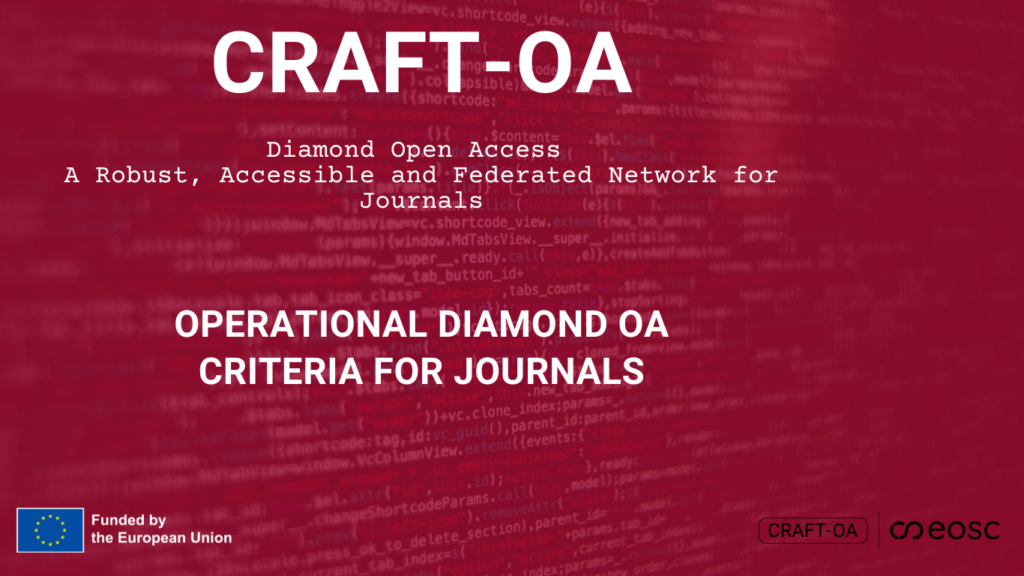The DIAMAS and CRAFT-OA projects are happy to present their operational criteria for selecting Diamond OA journals to the community. This set of criteria has been issued to facilitate the identification of Diamond OA journals within the projects’ framework and services.
What are the operational criteria for Diamond OA journals?
The Diamond OA criteria for journals are a set of operational criteria that allow for a binary classification between Diamond OA journals (journals that fulfil all these criteria) and non-Diamond OA journals (journals that do not fulfil all these criteria).
What have they been developed for?
The Diamond OA criteria for journals have been developed to make a clear distinction between Diamond OA journals and non-Diamond OA journals in the context of the Diamond Discovery Hub, which will host a list of Diamond OA journals fulfilling the criteria. The scope of their application is pragmatic; we do not claim the criteria have an application beyond this specific context, nor do they confer a quality label to the journals fulfilling the criteria.
How have they been developed?
The criteria were developed by a task force comprising members from both the CRAFT-OA and DIAMAS projects. At a later stage of development, a draft of the criteria was the subject of a community consultation. After discussing and implementing the feedback and criticism gathered, the task force released the final version of the Diamond OA criteria for journals.
Below are the 6 criteria as defined by the task force in collaboration with the community.
- Persistent identification:
The journal should have a valid and confirmed ISSN (https://www.issn.org/).
- Scholarly journal:
The journal should be a scholarly journal that selects papers via an explicitly described evaluation process before and/or after publication, in line with accepted practices in the relevant discipline (See also DOAS https://doi.org/10.58121/Z15S-JY03).
- Open Access with open licenses:
All outputs of the journal should be Open Access and carry an open license that is included in the article-level metadata.
- No fees:
Publication in the journal is not contingent on the payment of fees of any kind (e.g. article processing charges or membership dues). The journal should state this as such on its webpage. Voluntary author contributions and donations are allowed, if this is not a condition for publication.
- Open to all authors:
Authorship in the journal should not be limited to any type of affiliation. Any author can submit an article that is in line with the aims and scope of the journal.
- Community-owned:
The journal title must be owned by public or not-for-profit organisations (or parts thereof) whose mission includes performing or promoting research and scholarship. These include but are not limited to research performing organisations (RPOs), research funding organisations (RFOs), organisations connected to RPOs (university libraries, university presses, faculties, and departments), research institutes, and scholarly societies. The journal should explain its ownership status on its webpage.
These criteria have been authored by:
Clara Armengou (DOAJ)
Margo Bargheer (Göttingen State and University Library)
Arnaud Gingold (OPERAS/OpenEdition)
Sy Holsinger (OPERAS)
Mikael Laakso (TSV)
Dominic Mitchell (DOAJ)
Pierre Mounier (OPERAS/OpenEdition)
Janne Pölönen (TSV)
Johan Rooryck (cOAlition S)
Milica Ševkušić (EIFL)
Irakleitos Souyioultzoglou (OPERAS)
Hanna Varachkina (Göttingen State and University Library)

 CRAFT-OA is funded by the European Union under Grant Agreement no. 101094397. Views and opinions expressed are however those of the author(s) only and do not necessarily reflect those of the European Union or European Commission. Neither the European Union nor the granting authority can be held responsible for them.
CRAFT-OA is funded by the European Union under Grant Agreement no. 101094397. Views and opinions expressed are however those of the author(s) only and do not necessarily reflect those of the European Union or European Commission. Neither the European Union nor the granting authority can be held responsible for them.